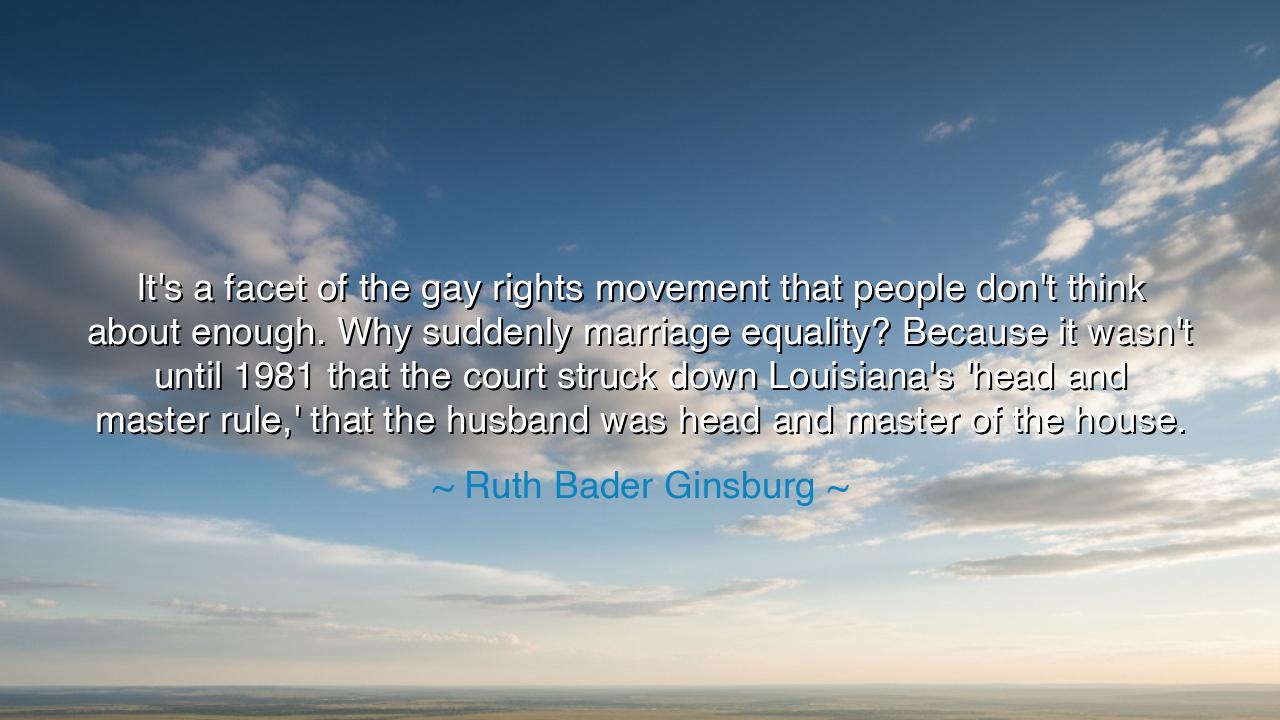
It's a facet of the gay rights movement that people don't think
It's a facet of the gay rights movement that people don't think about enough. Why suddenly marriage equality? Because it wasn't until 1981 that the court struck down Louisiana's 'head and master rule,' that the husband was head and master of the house.






“It's a facet of the gay rights movement that people don't think about enough. Why suddenly marriage equality? Because it wasn't until 1981 that the court struck down Louisiana's 'head and master rule,' that the husband was head and master of the house.” Thus spoke Ruth Bader Ginsburg, the jurist who stood like a flame in the dark halls of inequality, burning away the old shadows of injustice with the light of reason. Her words, calm yet cutting, reveal a profound truth about the slow evolution of equality—that progress comes not in leaps of fortune, but in the steady breaking of chains, one link at a time. She reminds us that freedom is not born in an instant; it is built upon the ruins of every old injustice we dare to dismantle.
In her reflection, Ginsburg speaks not only of marriage equality for same-sex couples, but of the deeper roots of equality itself—the long struggle to rid human law of its ancient hierarchies. The ‘head and master rule’, which she references, was a relic of patriarchy’s iron age. Under that law, the husband alone held legal authority over the household, over property, and, by extension, over the life of his wife. She could not sell or manage what they jointly owned without his consent. It was not until 1981, scarcely a generation ago, that this doctrine fell, and women were recognized as equal partners under the law. Only then, Ginsburg notes, could society begin to imagine a marriage not of dominance, but of partnership—and from that vision, the possibility of marriage equality for all could emerge.
Her insight unveils the hidden continuity between struggles for justice. The fight for gender equality paved the way for the fight for LGBTQ+ rights, just as the abolition of slavery made possible the movements for civil rights, and civil rights, in turn, inspired the global awakening of human rights. Each victory lifts the ceiling for the next generation. But as Ginsburg wisely reminds us, one cannot demand equality in one realm while clinging to oppression in another. A society that still proclaimed “the husband is master” could never have conceived of marriage as a union of equals, much less extended that equality to same-sex couples. Freedom must be whole, or it is hollow.
Consider the tale of Sarah and Angelina Grimké, sisters of the early 19th century, born into the slaveholding aristocracy of South Carolina. They were among the first women to speak publicly against slavery—but as they did so, they found themselves silenced not for their abolitionism, but for daring, as women, to speak in public at all. Their fight for the enslaved awakened in them the realization that their own chains were social, not physical—and that justice could not be divided. “Can you not see,” wrote Angelina, “that the rights of the slave and the rights of woman rise or fall together?” Ginsburg’s words carry the same eternal echo: that all oppressions are kin, and all liberations are intertwined.
The ‘head and master’ law was not merely a statute—it was a symbol of an ancient mindset: that power must flow from the top down, from man to woman, from majority to minority, from ruler to ruled. The fall of that law marked a shift in the moral architecture of society. For the first time in centuries, marriage became recognized as a covenant between equals, not a contract of subordination. And only within that new understanding could the question arise: if love between man and woman is an equal bond, why should love between two men or two women be denied the same dignity? The roots of marriage equality were nourished in the soil of women’s equality; one tree cannot flourish without the other.
Ginsburg’s brilliance lay in her ability to see law not as cold doctrine, but as a living organism that grows with the moral conscience of the people. Her quote is not simply a reflection—it is a lesson in the interdependence of justice. She teaches that we cannot isolate causes; every right denied to one group endangers the rights of all. The arc of progress, as she understood it, bends not by accident but by the cumulative weight of each correction, each truth finally spoken, each ancient prejudice overturned.
So, my listener, take her words to heart: when you fight for justice, fight for all. Do not think your struggle is separate from another’s, for freedom is a single garment, woven of many threads. If one strand is torn, the whole fabric frays. Honor the legacy of those who came before—the women who rose against patriarchy, the lovers who defied law for love, the dreamers who built the path you now walk upon. And when you see injustice, do not wait for history to move—be the hand that moves it.
Thus, the wisdom of Ruth Bader Ginsburg endures: that the story of equality is not the triumph of one group, but the awakening of humanity itself. Each victory is but a verse in a larger hymn—a hymn of justice, dignity, and unity, sung by countless voices across time. And when we lift our voices together, no rule, no prejudice, no master of the old world can silence the song of freedom again.






AAdministratorAdministrator
Welcome, honored guests. Please leave a comment, we will respond soon